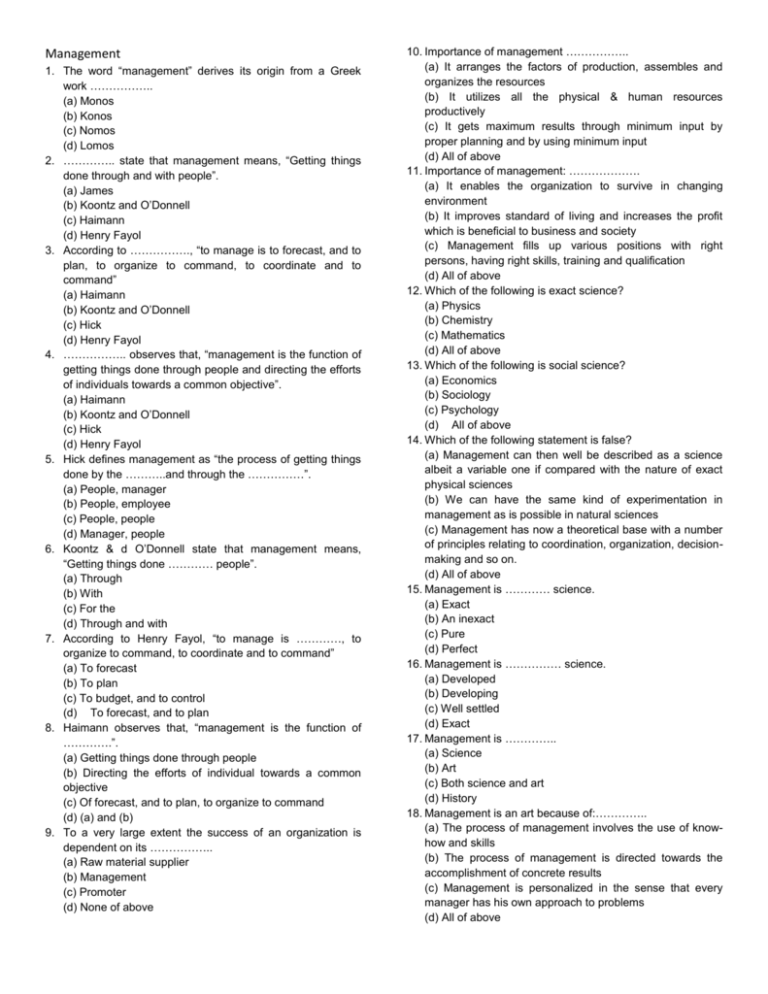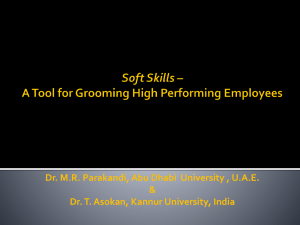Business Management 1
advertisement

Management 1. The word “management” derives its origin from a Greek work …………….. (a) Monos (b) Konos (c) Nomos (d) Lomos 2. ………….. state that management means, “Getting things done through and with people”. (a) James (b) Koontz and O’Donnell (c) Haimann (d) Henry Fayol 3. According to ……………., “to manage is to forecast, and to plan, to organize to command, to coordinate and to command” (a) Haimann (b) Koontz and O’Donnell (c) Hick (d) Henry Fayol 4. …………….. observes that, “management is the function of getting things done through people and directing the efforts of individuals towards a common objective”. (a) Haimann (b) Koontz and O’Donnell (c) Hick (d) Henry Fayol 5. Hick defines management as “the process of getting things done by the ………..and through the ……………”. (a) People, manager (b) People, employee (c) People, people (d) Manager, people 6. Koontz & d O’Donnell state that management means, “Getting things done ………… people”. (a) Through (b) With (c) For the (d) Through and with 7. According to Henry Fayol, “to manage is …………, to organize to command, to coordinate and to command” (a) To forecast (b) To plan (c) To budget, and to control (d) To forecast, and to plan 8. Haimann observes that, “management is the function of ………….”. (a) Getting things done through people (b) Directing the efforts of individual towards a common objective (c) Of forecast, and to plan, to organize to command (d) (a) and (b) 9. To a very large extent the success of an organization is dependent on its …………….. (a) Raw material supplier (b) Management (c) Promoter (d) None of above 10. Importance of management …………….. (a) It arranges the factors of production, assembles and organizes the resources (b) It utilizes all the physical & human resources productively (c) It gets maximum results through minimum input by proper planning and by using minimum input (d) All of above 11. Importance of management: ………………. (a) It enables the organization to survive in changing environment (b) It improves standard of living and increases the profit which is beneficial to business and society (c) Management fills up various positions with right persons, having right skills, training and qualification (d) All of above 12. Which of the following is exact science? (a) Physics (b) Chemistry (c) Mathematics (d) All of above 13. Which of the following is social science? (a) Economics (b) Sociology (c) Psychology (d) All of above 14. Which of the following statement is false? (a) Management can then well be described as a science albeit a variable one if compared with the nature of exact physical sciences (b) We can have the same kind of experimentation in management as is possible in natural sciences (c) Management has now a theoretical base with a number of principles relating to coordination, organization, decisionmaking and so on. (d) All of above 15. Management is ………… science. (a) Exact (b) An inexact (c) Pure (d) Perfect 16. Management is …………… science. (a) Developed (b) Developing (c) Well settled (d) Exact 17. Management is ………….. (a) Science (b) Art (c) Both science and art (d) History 18. Management is an art because of:………….. (a) The process of management involves the use of knowhow and skills (b) The process of management is directed towards the accomplishment of concrete results (c) Management is personalized in the sense that every manager has his own approach to problems (d) All of above 19. Management qualifies all tests of a profession except …….. (a) Dominance of service motive (b) Restricted entry (c) Systematic body of knowledge (d) Use of know-how and skills 20. Which of the following approach or its scholars believe that clear understanding of the management theories can only be developed by the study and analysis of cases and comparative approach? (a) Interpersonal Behaviour Approach (b) Empirical Approach (c) Group Behaviour Approach (d) Decision Theory Approach 21. Scholars belonging to ……………..feel that study of management should be based on interpersonal relations. (a) Empirical Approach (b) Group Behaviour Approach (c) Interpersonal Behaviour Approach (d) Decision Theory Approach 22. ………….. is termed as ‘behavioural science’, ‘leadership’ or ‘human relations’ approach by different group of scholars. (a) Empirical Approach (b) Group Behavior Approach (c) Interpersonal Behaviour Approach (d) Decision Theory Approach 23. ……………. has basically centered on studying the behavioural pattern of members and groups in an organization. (a) Empirical Approach (b) Group Behaviour Approach (c) Interpersonal Behaviour Approach (d) Decision Theory Approach 24. ……………….. is concerned with the persons, or organizational groups making the decision, or with the analysis of the decision making process. (a) Empirical Approach (b) Group Behaviour Approach (c) Interpersonal Behaviour Approach (d) Decision Theory Approach ACCOUNTS 25. Operation researches and analysis primarily belong to group of …………. (a) Group Behaviour Approach (b) Interpersonal Behaviour Approach (c) Empirical Approach (d) Mathematical Approach 26. Scholars belonging to …………are of the opinion that if planning, decision-making, organising, etc., conform to logical processes then the same can easily and suitably be presented in mathematical symbols. (a) Group Behaviour Approach (b) Mathematical Approach (c) Interpersonal Behaviour Approach (d) Empirical Approach 27. ……………., popularly known as the ‘founder of modern management theory’. (a) Frederick Taylor (b) Luther Gulick (c) Newmann and Summer (d) Henry Fayol 28. Henry Fayol, the ……………. industrialist and popularly known as the ‘founder of modern management theory’. (a) German (b) French (c) Greek (d) American 29. …………. coined the word POSDCORB (a) Luther Gulick (b) Newmann and Summer (c) Henry Fayol (d) Marshall 30. Which word did Luther Gulick coin using the initial letters of management? (a) POSBRD (b) POSDCORB (c) POSDCORBAC (d) POCDAORB






